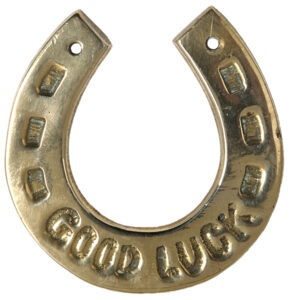Horse Betting Superstitions
Horse betting superstitions are like any other thing in life; when you’re winning they make perfect sense, but when you lose they are stupid so keep that mind with your Kentucky Derby 2014 picks and predictions.
One of the most famous superstitions at the racetrack is peanuts are bad luck. That’s why they do not sell them at any track or so they say. Maybe the ballpark concessionaire has a corner on the market. As a kid, I remember several horsemen of my father’s era saying that gray horses and horses with four white feet are considered unlucky in racing. Of course, we know that doesn’t always hold true. Also, there are trainers who habitually avoid the color red; they say it’s bad luck. Here is a little old English horse-buying proverb to coincide with this theme of superstition:
One white foot, buy him.
Two white feet, try him.
Three white feet, be on the sly.
Four white feet, pass him by.

This idea came about because some horsemen thought white hooves were more brittle and prone to injury than black ones. As far as I know, there hasn’t been any research on this nor has there been a higher number of break downs of gray horses or white legged ones for that matter..
Perhaps the superstitions came about because horse racing and gambling is so uncertain that horsemen and bettors want something they feel that they can control. Sort of like rubbing your favorite slot machine before you insert any money, or wearing your favorite tie or ring. And, if at the track and your horse should win, be sure to park in the same area next time!
Then there is the story of the race trainer Sam Hildreth, a man who put great faith in his dreams, especially when betting. One night, Hildreth dreamed of a large hat. The next day he scanned the entries for a horse with the word “hat” in his name. He found two, Hatrick and Top Hat. As luck would have it, both horses were entered in the same race, so Hildreth bet on both horses to win.
Hatrick and Top Hat ran nose-to-nose, well in front of the field for almost the entire race. But just when it looked as though they were going to finish first and second, another horse came flying down the stretch to snatch victory away from the two “hat”-in-the-name horses.
The name of that winner was Sombrero.
